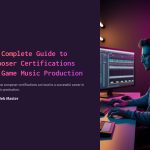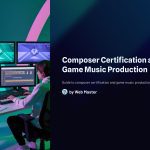 Are you interested in pursuing a career as a composer, or perhaps want to specialize in creating music for video games? In today’s digital age, the combination of formal music education and technical skills can help you carve out a successful career in the exciting world of game music production. This guide will help you understand how a composer certification can benefit you and what steps are involved in mastering the art of game music production.
Are you interested in pursuing a career as a composer, or perhaps want to specialize in creating music for video games? In today’s digital age, the combination of formal music education and technical skills can help you carve out a successful career in the exciting world of game music production. This guide will help you understand how a composer certification can benefit you and what steps are involved in mastering the art of game music production.

What Is a Composer Certification?
A composer certification is a professional credential that verifies your knowledge and skills in music composition. While it’s not always required to work as a composer, it can be extremely beneficial in establishing credibility and opening doors for opportunities in competitive fields like film scoring, video game music, and advertising jingles.
What Does a Composer Certification Entail?
Most composer certification programs focus on the fundamentals of music theory, composition techniques, and how to work with different instruments and orchestration. Depending on the program, you may also dive into specific areas such as film music, video game music, and other specialized forms of composition. Typically, the curriculum covers:
- Music Theory: Understanding scales, chords, harmonies, and time signatures.
- Composition Techniques: How to create melodies, orchestrate for various instruments, and build full musical pieces.
- Technology in Music: Learning how to use music production software and digital audio workstations (DAWs) like Ableton, FL Studio, or Logic Pro.
- Music Notation: Familiarity with how to write and arrange music, which is essential for orchestral compositions or collaborations.
Having a formal qualification can help you get noticed, but it is not a guarantee of success. Ultimately, building a strong portfolio and gaining industry experience is crucial.

Why Is Composer Certification Important for Game Music Production?
The world of game music production is highly competitive. A composer certification can provide a solid foundation, but the specific skills required for game music production go beyond traditional composition. In games, the music must adapt to the dynamic nature of the gameplay, responding to players’ actions and changing environments in real-time.
How Does Game Music Differ from Other Types of Composition?
When composing music for video games, the goal is not only to create beautiful melodies but to enhance the player’s experience. Game music has unique challenges, including:
- Interactive Music: Unlike films or traditional music, video game music needs to change based on gameplay. For instance, music may shift depending on the player’s progress, emotional state, or the intensity of a battle.
- Adaptive Soundtracks: Many games use dynamic music that shifts when certain in-game events happen. For example, a calm piece may morph into an intense battle theme when the player faces an enemy.
- Looping and Seamlessness: Game music often needs to be looped seamlessly so that it doesn’t sound repetitive to the player. Smooth transitions are a key part of game music production.

How to Start Producing Music for Video Games
Once you have a composer certification, the next step is learning how to apply your skills specifically to video game music production. Here are some steps to guide you:
1. Understand the Game’s Theme and Genre
Each video game is unique, and understanding the game’s theme, genre, and target audience is crucial to composing the right music. The soundtrack of a fantasy RPG will differ from that of a fast-paced racing game or a horror game. Analyze the style and tone of the game to ensure your compositions align with its aesthetic.
2. Learn Music Software and Tools
Familiarity with digital audio workstations (DAWs) and music production software is essential. Popular DAWs for game music composition include:
- Logic Pro X: Known for its robust sound library and tools for composing and mixing.
- Ableton Live: Excellent for creating loops and electronic music.
- FL Studio: Popular for electronic and hip-hop music.
- Cubase: Known for its composition tools and orchestral capabilities.
In addition to DAWs, you will need to become comfortable with virtual instruments (VSTs), sound libraries, and plugins to create professional-grade game music.
3. Learn About Interactive Sound Design
One of the most unique aspects of game music is the interactivity. You’ll need to learn how to implement your music within a game engine like Unity or Unreal Engine. This process involves:
- Audio Middleware: Tools like FMOD or Wwise are used to create interactive sound systems, making your music respond to in-game actions.
- Game Engine Integration: Understanding how to export and integrate your music tracks into the game engine for real-time playback is crucial.

Collaborating with Game Developers
In game music production, collaboration is key. As a composer, you will work closely with game developers, designers, and sound engineers to ensure the music fits seamlessly with the gameplay experience.
Key Skills for Collaboration:
- Communication: Understanding the developer’s vision for the game’s soundscape is essential. Be prepared to receive feedback and adjust your compositions.
- Flexibility: Game development is a dynamic and evolving process. You must be able to make changes to your music at different stages of production.
- Understanding Game Mechanics: Familiarize yourself with how gameplay elements affect sound and music. This includes everything from character movements to environmental changes.

Industry Trends and Opportunities in Game Music Production
The video game industry is growing at a rapid pace, and with it, the demand for high-quality music is increasing. Here are some trends to consider:
1. Indie Games: With the rise of indie game developers, there is an increasing demand for game composers who can create unique and memorable soundtracks on a smaller budget.
2. Virtual Reality and Immersive Experiences: As virtual reality (VR) and augmented reality (AR) games become more popular, the demand for interactive and immersive soundtracks is expected to grow.
3. Interactive Music in Streaming: With the rise of streaming platforms like Twitch and YouTube Gaming, live streaming events often feature game soundtracks. This has opened up new avenues for composers to showcase their work.

Conclusion: Combining Certification and Passion
Getting a composer certification is a great step toward becoming a professional in game music production. However, true success in the field will come from a combination of formal education, practical experience, and a deep understanding of the video game industry’s unique requirements. With the right knowledge, tools, and creative vision, you can craft music that enhances the gaming experience and resonates with players.
Q&A
Q: Do I need a composer certification to work in game music production?
While a certification is not mandatory, it can help you build foundational knowledge and credibility. More importantly, it provides a structured approach to learning the skills needed for professional composition.
Q: What software do game composers use?
Game composers use various DAWs like Logic Pro X, Ableton Live, and FL Studio. Additionally, audio middleware tools like FMOD or Wwise are often used to integrate music with gameplay.
Q: Can I work as a freelance game composer?
Yes, many game composers work as freelancers, collaborating with indie developers or larger studios. Networking and building a portfolio of work is essential to landing freelance projects.
Wrapping Up
Whether you’re looking to obtain a composer certification or dive into the world of game music production, now is a great time to explore this exciting career. With the rise of indie games, new technology, and a growing global gaming community, there are endless opportunities to create music that enhances players’ experiences and elevates games to new heights.
*Capturing unauthorized images is prohibited *
*




